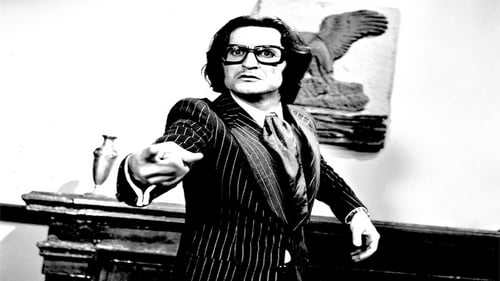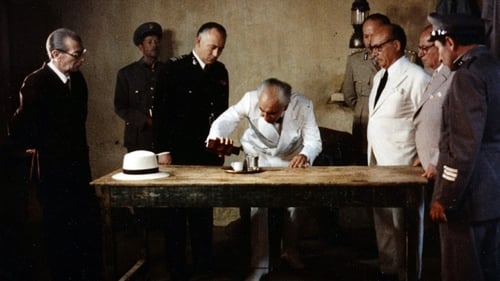
"4th century AD and a brilliant craftsman of Dionysus, Timothy, organizes a performance of Euripides' Bacchae, rousing the people against the emperor. Lazarus, the Cappadocian, is sent to suppress the rebellion and arrest the heretic. We are in the years of the total establishment of Christianity, in a climate full of sects, conspiracies, conflicts of power and personal ambitions, in the city of Antioch, which was the last cradle of the Greek education of the Gentiles."

Zamanos

Prosecutor #1
A gifted electrician, Michalis Karamanos works for Greek Telecommunications Organization and it seems that he is the only one who hasn't been completely absorbed by the corrupt and all-devouring system. Acting as a member of the revolutionary organization Constitutional Struggle, which is fighting against the unpopular policy of the government, he connects the computer of the director of OTE to an explosive device. He threatens to destroy the telecommunications of the country if he is not allowed to broadcast on television his revolutionary message during the broadcast of an important football game. The Authorities, thinking that he has gone crazy, try to bring him around using his old friends from the army, whom they pick up one by one as intermediaries. This is a situation comedy with excellent, mature plot development, plenty of suspense as well as masterful criticism of sociopolitical reality.

Airport Director

Stefanos Liosis

"Arpa-colla" in Greek literally means "Grab and stick", a phrase used to show something that has been done quickly and therefore isn't good enough. This is what the 2 main heroes of the film are doing. The one is a director(Giorgos) and the other an author(Kostas) with communistic ideas, who has won a prize at a festival. They both want to make a movie for the cinema. But every idea they have never comes true, because every time they meet someone to whom they tell their idea, they change their mind, and they want to make a totally different movie, ideas varying from political cinema to Greek historical dramas and modern films with motorcycle gangs. Not a bad attempt for the Greek cinema of the early 80's, which starts to wake up from the hibernation of the 70's.

Lawyer
A provincial café owner, Mimis, abandons his village in Chalkidiki and comes to Athens in search of a better life. He pretends to be a tough guy, a know-it-all, and behaves like an “antisocial”. With the help of a friend of his from the army, Aristeidis, he tries to set up his own business. At the same time, he falls in love with a seamstress, Toula, who is the sister of Aristeidis’ wife. Then comes the wedding, the everyday obligations, and Mimis is forced, with great resentment, to work as a waiter to make ends meet. When he get fired, however, his relationship with Nitsa is put to the test.

Inspector Alexiou
Kostas es un todopoderoso magnate, enamorado de su bella esposa Iro, quien, sin embargo, le engaña con un joven playboy llamado Nikos. Los dos amantes planean matar a Kostas durante una regata de vela, donde el crimen puede parecer un accidente. Allí, es el cuerpo de Nikos el que cae al mar y desaparece. La policía investiga las causas del accidente mientras Iro sostiene que su amante ha sido asesinado.

With a title that expresses the connection/disagreement of bios (βίος) = life, and graphi (γραφή) = writing, this film of Rentzis has as a subject “the passage from homo universalis to homo industrialis”. Based on a visual material provided by the collage book of the Basque Chumy Chúmez, the film forms, out of cultural deposits of the industrial era, a novative oneirographic discourse, through the audacious and unprecendeded claim of a combinatorial optimization of collage/montage techno-poetics. Viewing the body as historical ideotype ‘the sublime point of reference, a matrix and a refusal of all signs’, Rentzis, dissects the body of film, makes an inter-parody of historical utopias and certainties and moves between animation and expanded cinema in order to reflect on the broader social, political question of our social coexistence condition, the unity and rupture.

A young man who grew up beneath the heavy shade of autocratic and avaricious mother, son Gregory, has lost initiative and the minimum footprint. The servility of his mother against his boss, which facilitates the solicitations of the latter to his sister, infuriates him. The fiancée, Soula, can not understand his sexual desires and his girlfriend, Julia, the only one that loves him really forced to abandon him. Gregory wonder with all this and rebels, but his rebellion brings him to the brink of madness. When you finally meet, forced to follow the commands of the mother and uncle ultraconservative so he marries the woman who suggest those.

At midnight, on a deserted Athenian street, a beautiful woman named Eleni Chalkia is fatally stabbed by a stranger, who immediately disappears into the shadows. The murderer is Ioannis Zachos (Manos Logiadis), a young man lacking in both mental and sexual stability, who lives out his erotic fantasies through purifying violence. He often fantasizes about killing beautiful women, in this way compensating for his deficient manhood and satisfying his passion for power. When he is arrested, he immediately confesses his crimes, which is a relief to the police, who have been accused of gross ineptitude by the press. During the trial that follows, the relentless question, “who is ultimately guilty? Man or society?” is again raised.

Kontaxis
The assassin of a prominent trade unionist takes a conservative MP hostage, throwing in the government into disarray.







